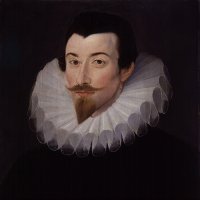Queen Elizabeth I had many godchildren throughout her reign, but one of the most notable was Sir John Harrington, who held a special place in her heart. Sir John Harrington was the son of Queen Elizabeth's close confidant, John Harrington, and his wife, Isabella Markham. He was born on August 4, 1561, in Kelston, Somerset, England.
John Harrington's father was an esteemed courtier and a friend of the Queen, which led to a close relationship between the young Harington and Elizabeth. As a child, John was often brought to court, where he caught the Queen's attention with his wit, intelligence, and charm. Impressed by his abilities, Queen Elizabeth I decided to become his godmother, a significant honor that demonstrated her favor and affection towards him.
Under Queen Elizabeth's patronage, John Harrington received an excellent education, which included studying at Eton College and King's College, Cambridge. He excelled in his studies, particularly in languages and literature. He had a passion for writing, and his skills as a poet and playwright flourished under the Queen's encouragement.
In addition to his literary pursuits, John Harrington was also known for his inventive mind. He is credited with inventing the first flush toilet, which he called the "Ajax." The Queen herself was said to have had one of these toilets installed at her palace in Richmond. Harington's ingenuity and creativity impressed Queen Elizabeth, further cementing their bond.
Throughout his life, Harrington remained loyal to Queen Elizabeth and dedicated several of his works to her. One of his most famous works was "The Metamorphosis of Ajax," a mock-heroic poem in which he humorously described the workings of his invention. The poem was dedicated to the Queen, and she enjoyed it so much that she rewarded Harington with a New Year's gift of £100.
Despite their close relationship, Queen Elizabeth I did not formally appoint John Harrington to any significant political or official positions. Nevertheless, Harrington remained a trusted advisor and friend to the Queen. He frequently visited the royal court and was often invited to entertain the Queen with his wit and literary talents.
After Queen Elizabeth's death in 1603, John Harrington's relationship with the royal family continued. He became a courtier to King James I and was knighted in 1603. He held various positions in the royal household and remained an influential figure in literary and social circles.
Sir John Harrington's godson status granted him a unique place in Queen Elizabeth I's court. It symbolized the Queen's trust and affection for him, and their relationship left a lasting impact on Harrington's life. His works and inventions, as well as his connection to the Queen, ensured his place in history as an important figure of the Elizabethan era.
